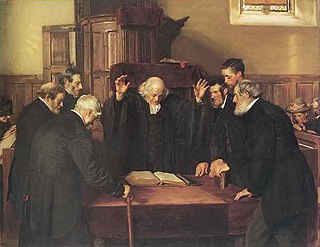Related Research Articles

Presbyterianism is a part of the Reformed (Calvinist) tradition within Protestantism that broke from the Roman Catholic Church. Presbyterian churches derive their name from the presbyterian form of church government by representative assemblies of elders. Many Reformed churches are organised this way, but the word Presbyterian, when capitalized, is often applied to churches that trace their roots to the Church of Scotland or to English Dissenter groups that formed during the English Civil War.
Presbyterianpolity is a method of church governance typified by the rule of assemblies of presbyters, or elders. Each local church is governed by a body of elected elders usually called the session or consistory, though other terms, such as church board, may apply. Groups of local churches are governed by a higher assembly of elders known as the presbytery or classis; presbyteries can be grouped into a synod, and presbyteries and synods nationwide often join together in a general assembly. Responsibility for conduct of church services is reserved to an ordained minister or pastor known as a teaching elder, or a minister of the word and sacrament.

The Presbyterian Church of Eastern Australia (PCEA) is a small Presbyterian denomination which was formed in Sydney on 10 October 1846 by three ministers and a ruling elder. As of December 2012 it consists of 13 pastoral charges with a total of 17 regular preaching points, 12 serving ministers, 1 minister without charge, 6 retired ministers and a community of about 800.

The Presbyterian Church in Canada is a Presbyterian denomination, serving in Canada under this name since 1875. The United Church of Canada claimed the right to the name from 1925 to 1939. According to the Canada 2001 Census 409,830 Canadians identify themselves as Presbyterian, that is, 1.4 percent of the population.
The World Alliance of Reformed Churches (WARC) was a fellowship of more than 200 churches with roots in the 16th century Reformation, and particularly in the theology of John Calvin. Its headquarters was in Geneva, Switzerland. They merged with the Reformed Ecumenical Council in 2010 to form the World Communion of Reformed Churches.
The Free Church of Scotland is an evangelical, Calvinist denomination in Scotland. It was historically part of the original Free Church of Scotland that remained outside the union with the United Presbyterian Church of Scotland in 1900. Now, it remains a distinct Presbyterian denomination in Scotland.

St Andrew's Church in Brussels (Ixelles) is a congregation in membership of both the Church of Scotland and the United Protestant Church in Belgium (EPUB/VPKB) Services are conducted in English. The congregation's mission statement is "We aspire to follow Jesus in bringing the knowledge of God's love to all".

St Andrew's Church is a congregation of the Church of Scotland in Rome, Italy, belonging to the Church's International Presbytery. Services take place every Sunday at 11:00 a.m. in Via XX Settembre, 7 00187 Rome. Rev Tara Curlewis is minister at St Andrew's and Liaison Officer for the Reformed Ecumenical Office in Rome.

A Church of Scotland congregation is led by its minister and elders. Both of these terms are also used in other Christian denominations: see Minister (Christianity) and Elder (Christianity). This article discusses the specific understanding of their roles and functions in the Scottish Church.

St Andrew's Church was a congregation of the Church of Scotland in the British overseas territory of Gibraltar and was part of the Presbytery of Europe. The church was opened in 1854. Whilst originally built primarily to serve as a garrison church for Scottish soldiers based in Gibraltar,it served the wider Presbyterian and Reformed Christian community of all nationalities.

Christianity is a minority religion in Sri Lanka. It was introduced to the island in first century. Traditionally, after Thomas the Apostle's visit in Kerala in AD 52, Christianity is said to have been introduced to Sri Lanka because of its close geographical and commercial ties.

According to the 2012 census, 6% of the population of Sri Lanka was Christian; of these, one in ten was Protestant, showing that there were approximately six Protestants for every 1,000 Sri Lankans. Later estimates suggest that this share has doubled in less than ten years.

The Scots Kirk, Lausanne, is a Protestant, presbyterian church situated in Lausanne, avenue de Rumine 24. It is part of the Church of Scotland's Presbytery of Europe and one of two congregations of the Church of Scotland in Switzerland, the other being the Scots Kirk in Geneva. Sunday services are in English.

St. Andrew's Scots Kirk, is located at 73 Galle Road, Colombo. The church was founded in the late 19th century, and prospered during the colonial and post-colonial periods. It was the centre for the Scottish community in Colombo.
The Presbytery of Glasgow is one of the 46 Presbyteries of the Church of Scotland. It dates back to the earliest periods of Presbyterian church government in the Church of Scotland in the late 16th century. The Presbytery of Glasgow currently has 125 congregations, making it by far the largest Presbytery in the Church of Scotland.
John Cairns Christie is a minister of the Church of Scotland. He was Moderator of the General Assembly of the Church of Scotland for 2010-2011.

The Scots International Church or the Scottish Church is located in Rotterdam, The Netherlands. An English-language Protestant church in the Presbyterian tradition, it is part of the Church of Scotland, within the Church's Presbytery of Europe.

The Reformed Presbyterian Global Alliance is a communion of Presbyterians originating in Scotland in 1690 when its members refused to conform to the establishment of the Church of Scotland. The Reformed Presbyterian churches collectively have approximately 9,500 members worldwide in Northern Ireland, the Republic of Ireland, Scotland, France, the United States of America, Canada, Japan, South Sudan, and Australia.
Scots Kirk or Presbyterian Church, Kandy, is Presbyterian church, located at 127 D. S. Senanayake Street, Kandy.